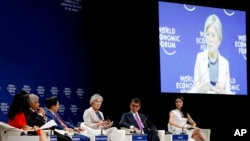The nations of Southeast Asia are continuing to take advantage of technological changes impacting the world, according to speakers at the World Economic Forum on Asean, which ended on Thursday in Hanoi, Vietnam.
Speakers at the forum discussed Asean’s role in what is known as the Industrial Revolution 4.0, a reference to the trend towards automation of industrial processes and new advances in computing.
Rajan Anandan, managing director of the tech giant Google’s Southeast Asia operations, said the “digital economy” was at the core of the new industrial revolution in the region.
“When you think about Asean, the ten countries combined, embedding digital economy in Asean is actually quite sizable growing very rapidly, but it has enormous potential,” he told attendees.
The forum was opened by Chu Ngoc Anh, Vietnam’s science and technology minister, who said new technological advances were a positive force for socio-economic development.
“It has dramatically changed societies, changed each country, including Vietnam and other Asean member countries,” he said.
Syed Deddig Syed Abdul Rahman, Malaysia’s youth and sports minister, said the country was working to develop “our own Silicon Valley” as well as assisting young people to gain the skills to compete.
He added that the success of the new technological innovations would depend upon the readiness of government in managing education and industrial policies.
Cambodian founders and entrepreneurs are also excited about the direction of new technologies such as the Internet of Things and cloud computing can take the country.
Chankiriroth Sim, CEO of Banhji, an online accountancy firm, said in an email that technology was allowing Cambodia’s entrepreneurs access to new sources of finance and new markets.
“Digitalization of their businesses is both an opportunity and a challenge. Improving productivity and efficiency, better access to finance and markets, and scalability are the opportunities resulting from adopting technology or working in partnership with technology startups,” he said.
According to a 2017 World Economic Forum paper, the changes brought about by new industrial techniques could dramatically change the manufacturing and service industries, particularly “low-skilled” jobs, on which large sectors of Southeast Asian society depends.
Cambodia has some 300,000 young people entering the labor market each year, with more than 600,000 people employed by the garment and footwear industry, posing questions about how Cambodia will be able to create jobs to fill the gap created by new technologies.
Pauline Tamesis, the resident coordinator of the United Nations in Cambodia, at a seminar on Industry 4.0 in Cambodia, suggested two things Cambodia must do to catch up with other Asean members in revolutionizing its industrial sector.
“The first is securing access for local producers… The second set of issues is bound up the labor substituting effects and the core comparative advantage of countries like Cambodia, which currently lies in labor-intensive productions," she said.







